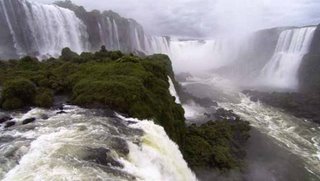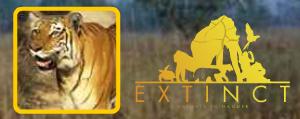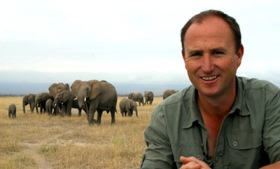BBC 1 Sunday 9pm (6 million, 23.5%)
BBC 2 Monday 7pm (2.5 million, 11.4%)
Are polar bears hot stuff at poker? Planet Earth is back in the Arctic to find out
From The Guardian - 06/11/2006As the wedding guest at Cana said, most people keep the cheap booze until the end of the party when the guests are too bladdered to notice (I paraphrase St John slightly), but Planet Earth (Sunday, BBC1) kept the best till the last.
It was the end of the Ice Worlds episode, during the diary section, which shows the struggling human beings behind the camera. Doug and Jason were sitting down to supper in a bleached wood hut in Kong Karis Land. Now, say what you like but a name like that, Kong Karis Land, does not fill you with confidence. It is in the Norwegian Arctic and has not been visited by humans for 25 years. I am not altogether surprised.
Doug said suddenly, "I thought I heard something." (For years I have been trying to persuade the BBC to give us some good ghost stories. They made up for it now.) A face appeared at the window. It looked like an enormous snowman - solid, white, compacted - with two pieces of coal for eyes. It pressed its big, black, boxing glove of a nose to the glass, melting the frost like a child rubbing a circle in the pane to see better. I have heard that polar bears are peculiarly dangerous because their face is a fixed mask. You cannot tell what they are thinking. They would be hot stuff at poker. I'm not sure this is totally true. This bear was clearly curious. Not angry. Not hungry. Nosy. It is a face that stays with you, like snow made flesh.
Earlier we saw a polar bear swimming slowly through black seas. It swam on for two days, looking for a seal to eat. Starving and weak, it smelled a huge herd of walrus, the largest and best-armoured of all seals. Pulling itself on to the ice, it waited, eyelids drooping, for its strength to return. Then, under cover of fog, it attacked a billowy, black, blubbery backside, trying to prise a walrus away from her young. And failed. And tried again. And failed. Gored and exhausted, within sight and smell of that tremendous fish supper, it lay down to die. It didn't make a big deal about death. It just curled up like a pup and slept.
You do feel the crew could have chucked it a kipper. As global warming has already disturbed the balance of nature, it may be time to rewrite the rule that natural history programmes can observe but must never interfere. In the Antarctic, Frederique, a field assistant, had no hesitation in helping an emperor penguin chick out of a hole, quite literally, saying endearingly, "Come on! Grab my hand! Out you come chicken!" We have reached the point where nature does need a helping hand.
- Nancy Banks-Smith
 BBC Four Sunday 10pm/Tuesday 7pm
BBC Four Sunday 10pm/Tuesday 7pm










 Sunday 5th November, 5.30pm
Sunday 5th November, 5.30pm